Posted: October 11th, 2013 | Author: The Pirate Shore | Filed under: Privacy | Tags: Global, Guide, prism, Privacy, Surveilalnce, Tempora, xkeyscore | 2 Comments »
Ever since spring-time this year we all know that we are all part of a global surveillance program, so sophisticated and deep-running that its almost unbelievable. I’m talking of course about PRISM (incl. XKeyscore and Tempora). All the information we put out on the internet is being intercepted by the forces behind these surveillance programs, I wish I could say that only one force is behind this all but unfortunately it is a collaborative effort between numerous international entities, such as the American NSA, German BKA and British MI6. With this Anti-Surveillance Guide we are trying to do our part in protecting global privacy.
What exactly do these surveillance programs do?
For starters, they collect all the information you willingly put up on the internet (think Blog Posts, Tweets, Facebook updates, picture uploads etc) and besides that they collect infinite amounts of Meta-data on individuals.
Meta-data is the data that describes your online actions e.g. you write an email to a friend, the meta-data of this email are things like your IP address, the location data of your IP, the time the email was sent, the mail client you’re running etc.
This meta-data is collected from your phone calls, voip calls (think skype, viber), e-mails, browsing history, online banking, instant messages (MSN, Whatsapp, iMessage etc).
Getting access to your computer and file-structures is also on the action plan of these surveillance programs.
Why should I care about all my information being collected?
Before you start thinking “But I’m not a threat, I haven’t done anything wrong.” Imagine it is 1930 and the internet and social media already existed. Poeple put their religious and political views on the web, thinking no harm can come of it. Three years later Hitler comes into power in Germany and has access to an immense database of his people, he immediately knows who is Jewish, who has political views that oppose the Nazi-party, who is likely to disobey etc.
We don’t know what the future will hold and therefore we have human rights laws that are supposed to protect our rights (including the right to privacy) no matter what the future brings.
Therefore it is important to protect your privacy and try not to feed the immense database any more.
How do I prevent being part of this global surveillance?
– Start by being very careful with what you put up on the internet. Always remember “Once on the web, on the web forever”.
– Stop using services provided by the internet giants (Facebook, Google, Apple, Microsoft, Yahoo) whenever you use any of these services you can be quite sure that all your activity will be visible by the forces behind the surveillance programs.
– Encrypt your communications (your messages, your calls, your emails, everything)
– Support Open-Source applications and services (open-source means that the source code of the app/service are open to see and use for everyone, this way people can have a look ‘behind the scenes’ and find out whether the app does what it claims it does, unlike proprietary software)
– Consider switching your computers operating system to Linux-based systems (as MAC OSX and Windows are provided by Apple and Microsoft, whom can’t be trusted to keep our information safe)
– Don’t fall for the cloud computing scam, Clouds are giant server centers that store all data and info in one place (perfect for NSA, MI6 etc) and are actually nothing new, its just Online Storage with a fancy name and the ability to sync faster than used to be. Try to host your own cloud if you own a server, or find a service that you are absolutely sure you can trust.
– Don’t trust browsers provided by the internet giants, Safari (Apple), Chrome (Google), Internet Explorer (Microsoft)
Where can I find alternatives?
A very good source of alternative browsing and communication options is https://www.prism-break.org
The amount of options can be quite overwhelming at first but just take your time and do your research step by step.
What are The Pirate Shore’s favorites?
Amongst our favorites are:
Browsers: Tor Bundle, Firefox
Browser-plugins: HTTPS Everywhere, HTTPS Finder, NoScript, DNTMe, AnonymoX
IM & VOIP: Linphone, Retroshare, Pidgin, Jitsi, Cryptocat, BitTorrent Chat (in development), Hemlis (in development)
Mail Client: Mozilla Thunderbird, Icedove
Mail Encryption: PGP
Online Storage (Cloud): ownCloud, BitTorrent Sync
Online payment: Bitcoin
File Encryption: TrueCrypt
Search Engine: Startpage.com (Google enhanced), Ixquick.com (results from over 5 different engines)
We haven’t had the chance to test every alternative yet but bare with us as we test more.
Soon we will be posting more detailed explanations of our favorite picks, in the meantime do your own research;)
Tell us about your favorite alternative software in the comments!
Posted: August 17th, 2013 | Author: The Pirate Shore | Filed under: Privacy | Tags: Ad, Guide, iOS 7, iPad, iPhone, Locations, prism, Privacy, Siri, surveilance, Tempora, tracking, xkeyscore | 1 Comment »
Momentarily, this post only concerns the beta testers of the new OS but soon enough iOS 7 will be unleashed unto the world and most likely break any adaption record that has been set in the past.
With this in mind we at the Pirate Shore decided to guide you through some important settings in the new OS in order to protect your privacy.
We’ll guide you through three steps you have to take in order to protect your privacy.
1. Frequent Locations
2. Ad-Tracking
3. Siri
So, lets start with Frequent Locations, a new setting in iOS 7, which makes your iDevice collect all your location data and display it on a detailed map (including the time you arrived, left and how often you visited that place).
How do you avoid this? Well, luckily the folks at Apple did give you the option to switch off this scary setting.
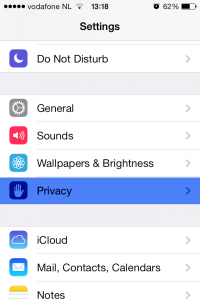
First, open the Setting app in your Springboard (your homescreen), then navigate to Privacy.
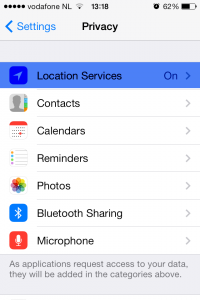
Now Select the Location Services, where you’ll find all the apps which have permission to use your Location, try to give as few as possible access to your location. If you scroll all the way down you will find a section called System Services, click it.
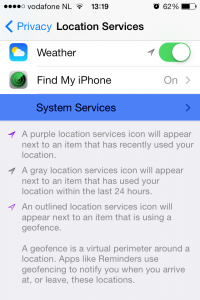
Here you find all the OS services which use your location, some necessary, others not so much.
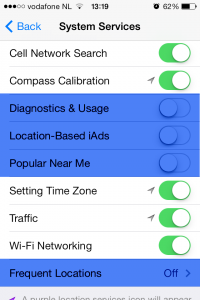
At this point I advise you to turn off the location access to Diagnostics & Usage as this information will be send to Apple and lets be honest we don’t want a multi billion dollar company to know where we are and how we use our phone (as I recall Apple claims that the diagnostic data will be anonymized before being sent to Apple, so turning this off is optional.)
The next to turn off is Location-Based iAds, the name is self explanatory and unless you enjoy specially targeted ads on your phone, I’d turn this off.
Popular Near Me is a new App Store feature in iOS 7, it shows you which apps are popular with people in your surroundings (I do not know the exact radius but I estimate 5km). To me this is a very unnecessary feature which will only give away my location to another party therefore I turned it off.
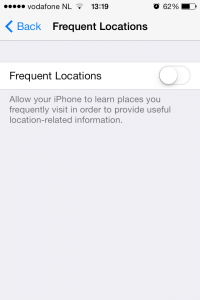
As you can see on the picture above Frequent Locations is turned Off on my iPhone, but it is On standard after installing iOS 7.
This is the screen with Frequent Locations turned off, but if turned on, you will see an option to Improve Maps and one where you can look at your personal map showing when and how often you’ve visited different places, with scaring accuracy as you can see below.
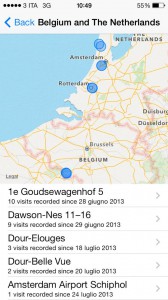
I understand that Apple explains this feature as a way to improve their Maps app and increase your convenience for more accurate location services but to me this is a very dangerous feature. At the risk of sounding paranoid, lets say someone wants to find you and hurt you, as soon as they get a hold of your Frequent Locations map they’ll know exactly where you like to go and at which times. Besides after all the recent PRISM, XKeyscore and Tempora revelations it doesn’t sound crazy to me that governments all over the world will be happy to collect these Maps.
After we have disable one privacy invading feature it is time for number 2 Ad-Tacking.
We all hate ads and ad companies for bombarding us with them, so why let them track us? Doesn’t make sense, so lets get rid of that.
Go back to your Settings app and return to the Privacy section.
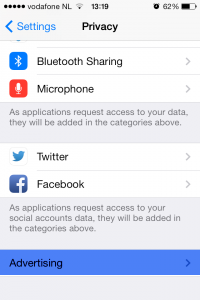
Scroll all the way to the bottom and you will find a section called Advertising.
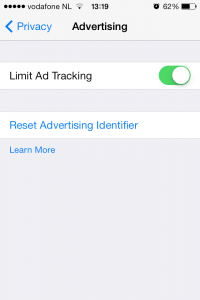
Make sure you enable the Limit Ad-Tracking option. This will tell the iAd service to not track you and not send you specifically targeted apps base don your location and online behavior. At this moment not every app uses the iAd service, some still use other methods of advertising in which case you might still be tracked. Apple claims they will force all developers to switch to the iAd service eventually but until then you’re not 100% safe from Ad-Tracking.
Click the Learn More button to read up on what Apple has to say.
Thats two down and one to go. The last one is Siri, for some the most important feature of an iPhone/iPad but for me almost the perfect Spyware.
I’ve been using Siri for over a year before actually reading the Privacy Agreement posted by Apple and once I’ve done that Siri has been immediately disabled and not turned on ever since. It was an easy decision for me since I’ve never properly used Siri except for the occasional laugh with friends. I understand some of you use it everyday and love it, but consider the privacy you’re trading in.
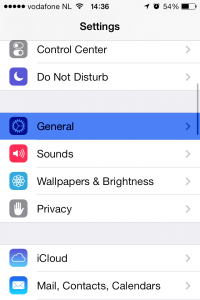
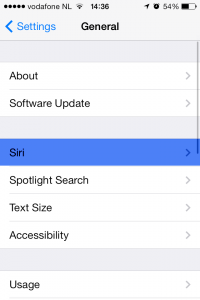
You’ll find the option to turn off Siri in your Settings app under General and then Siri as shown above. You’ll also find the Privacy Agreement from Apple regarding the use of Siri.
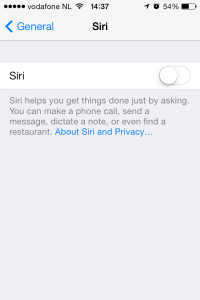
Just click the blue text About Siri and Privacy… and a long agreement will be shown.
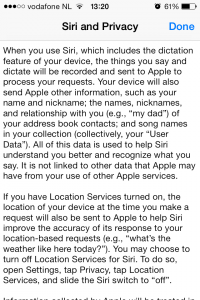
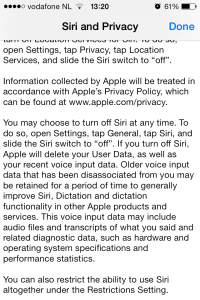
Once you’ve read it you’ll see that every time you use Siri, Apple will save a recording of your voice, your location, your name, nickname, and relationships with contacts such as family, partner etc and even data about your music library on their servers.
They claim that this data will not be associated with any other data they might have on you, which sounds reassuring but the fact remains that your trading in a whole lot of data for the simple convenience of not having to type.
There you go! Your iOS 7 device has now become less of a Privacy invasion and you can focus and the fun new features of this OS.
We realize that this guide might not be complete, in case we have missed something, please contribute to this guide by telling us about it in the comments!













Recent Comments